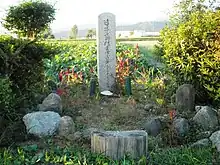Genki
Genki (元亀) was a Japanese era name (年号,, nengō,, lit. 'year" name) after Eiroku and before Tenshō. This period started in April 1570 and ended in July 1573.[1] During this time, the emperor was Ōgimachi-tennō (正親町天皇).[2]
Events of the Genki era

This is his grave of Endō Naotsune who was killed in the Battle of Anegawa near Nagahama in the 1st year of Genki
- 1570 (Genki 1, 6th month): At the Battle of Anegawa, the forces of Oda Nobunaga and Tokugawa Ieyasu won a victory.[3]
- 1571 (Genki 2, 9th month): Nobunaga ordered the destruction of temples on Mount Hiei.[3]
- 1573 (Genki 4): Oda Nobunaga causes the Ashikaga Yoshiaki, the last Muromachi shogun, to flee Kyoto[4]
Related pages
References
- Nussbaum, Louis-Frédéric. (2005). "Genki" in Japan encyclopedia, p. 238.
- Nussbaum, "Ōgimachi Tennō," p. 739; Titsingh, Isaac. (1834). Annales des empereurs du Japon, pp. 382-389.
- Titsingh, p. 388; Nussbaum, "Anegawa no Tatakai" at pp. 30-31.
- Nussbaum, "Ashikaga Yoshiaki" at p. 55.
Other websites
- National Diet Library, "The Japanese Calendar" -- historical overview plus illustrative images from library's collection
| Genki | 1st | 2nd | 3rd | 4th |
|---|---|---|---|---|
| 1570 | 1571 | 1572 | 1573 |
| Preceded by: Eiroku |
Era or nengō: Genki |
Succeeded by: Tenshō |
This article is issued from Wikipedia. The text is licensed under Creative Commons - Attribution - Sharealike. Additional terms may apply for the media files.